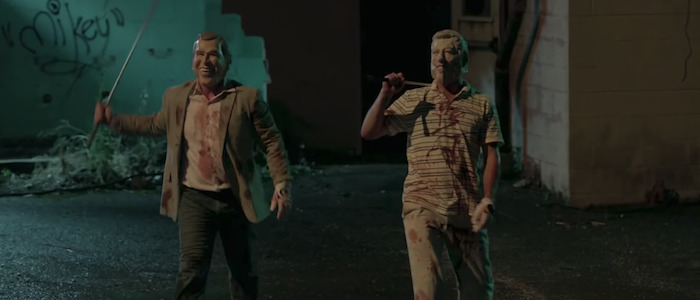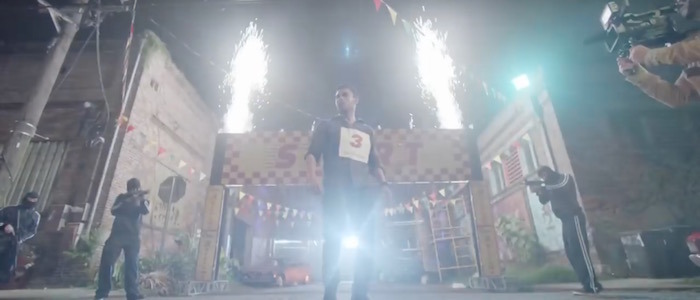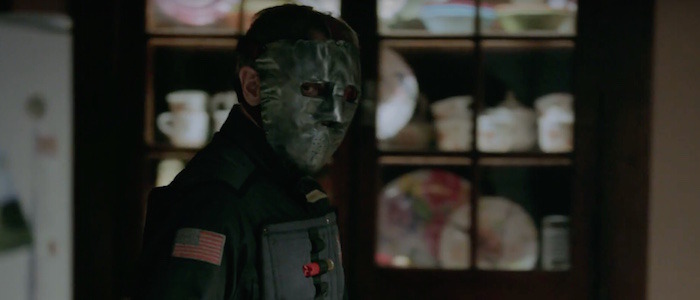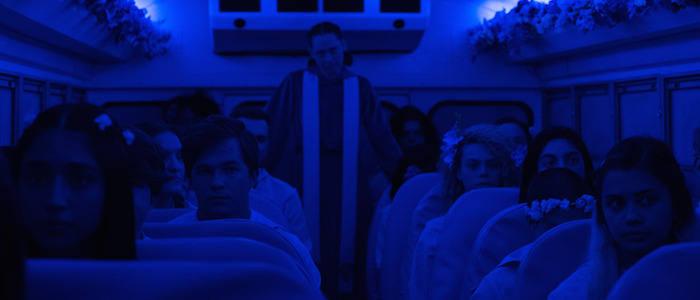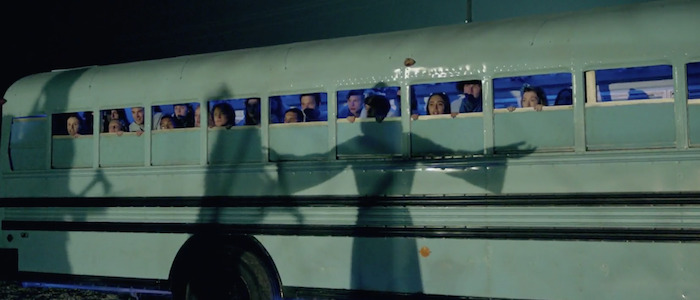Everything We Learned On The Set Of USA's 'The Purge' TV Series [Set Visit]
I'm not one to champion a whole bunch of sequels, prequels, and spinoffs, but let me tell you something — when it was announced that there was going to be a TV adaptation of The Purge, I perked right up. I'm a fan of the film franchise — and its unflinching indictment of our real-life dystopia highlighting our history of violence and rage — and I was interested to see how creator James DeMonaco and producer Jason Blum would expand the story in an episodic format. After visiting their New Orleans set back in June, I can say that at this point I am truly invested.
Premiering September 4 on USA, The Purge will be a 10-episode series that follows several characters as they struggle to survive on the one night of the year when all crime — including murder — is completely legal. As the night wears on, each character is forced to reckon with their past and their own self-motivations as they determine just how far they'll go to confront the horror around them.
The series, which revolves around the Purge's standard 12-hour period, is written and executive produced by showrunner Thomas Kelly. Here's everything we now know from the set visit.
Not everyone in the NFFA may be considered a clear-cut villain.
Like the films, conflicts happen that compel each character to participate in the Purge in some way or another — including non-threatening protagonists who we're inclined to root for — but it is the NFAA (the New Founding Fathers, who established the Purge) that has always been clearly identified as the villains. In the series, however, there will be one character in the NFFA, Joe (Lee Tergesen), who embodies shades of humanity that may challenge who we consider a protagonist.
This was an important intention for showrunner/executive producer Thomas Kelly, who described Joe as a "fairly likable" white working-class man who "had everything ripped from under him." After trying and failing one too many times, "he becomes a victim of a very cynical salesman of the NFFA, [who encourages him to join their cause by telling him] 'this is your right.'" he added. Whether or not Joe's actions and motivations will attract audiences remains to be seen, but it's this moral smearing that will definitely spark conversation among audiences.
The writers’ room is intentionally diverse in race, gender, and class in order to truthfully inform how the characters react and participate in the Purge.
Because so much of each character's identity hinges on how they respond to the Purge, it was important for Kelly to hire writers who could truthfully speak to some of the series' most profound statements on warfare triggered by sociopolitical motivations like poverty, racism, and classism. For instance, the character Jane (Amanda Warren) is a black woman who makes the decision to participate in the Purge after being continuously turned down for partner at her firm on account of her race and gender.
"[We] really tried to form those different points of view and sensitivities to the characters. I think our main cast speaks for itself. It's very diverse. Our story has different lives and experiences. It answers the commonality of how they'd react on the night of the Purge," Kelly explained.
The series uses flashbacks to create a more character-driven narrative.
Though the films offer references to whom the characters were before the Purge was established, we never fully see who they were and what their lives were like prior to the mayhem. The series, however, will show flashbacks informing us of their past decisions and how they've influenced their actions on the current Purge night. Kelly shared, "The movies are — and James would say this — ten minutes of character and the rest is 'will they survive the night?' In a ten-hour format, we get to delve into character. We don't just see our characters on the night of. We get to see what might have led them to make the decisions on the night of."
There is a safe haven where people can go on Purge night and not be killed.
What a concept. In the films, there is nowhere to go to hide from the horrors of the Purge. But in the series, there will be Pete's Cantina, a good old-timey bar ran by Pete the Cop where people — black, white, poor, and rich — can hang out, have a drink, and not be killed. It's designed to be peace in the midst of mayhem. "The main idea is that [purgers] would stop to think about doing the act," said Sharon Lomofsky, who designed the set and also worked on the previous two films (The Purge: Election Year and The First Purge). In fact, she went as far to say that that the setting underscores DeMonaco's message of anti-violence. "I think that's ultimately James' moral message: purging doesn't make you a better person. It doesn't solve your problems. Killing doesn't make you feel better. Revenge is not sweet."
The Purge is being planned as an anthology series.
Nothing is confirmed yet, but Kelly said that future seasons would likely feature different characters in different cities.
Though the series is set in the year 2027, 10 years into the first Purge, it will have the look and feel of today.
"We make no concessions to anything futuristic," Kelly said. This is also true of the movies, which makes them that more frightening to bear because the horror seems so palpable. Even down to the haunting costumes, the series looks exactly like what you see people wear today. The masks that the purgers wear, which mostly have a creepy DIY factor, also maintain that.
But the masks will have a chill factor designed to distort our image of admirable people.
In keeping with the series' smearing of morality when confronted with lawlessness, the masks worn by the killers will also challenge our perceptions of good and evil by using images of heroic figures — like a doctor or a nun — and twisting them to appear horrific. For instance, the doctor has a snake head, the nun is bleeding from the eyes, and a military officer has pantyhose covering his face and pearls for teeth (again, very DIY). There's a method to the madness that begins and ends with taking something very human and familiar and distorting it beyond our comfort levels.

